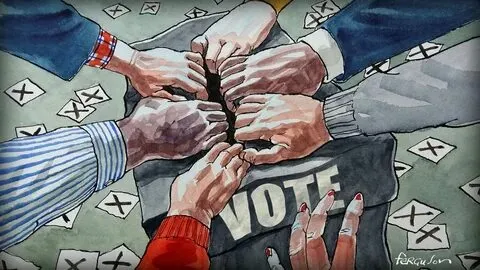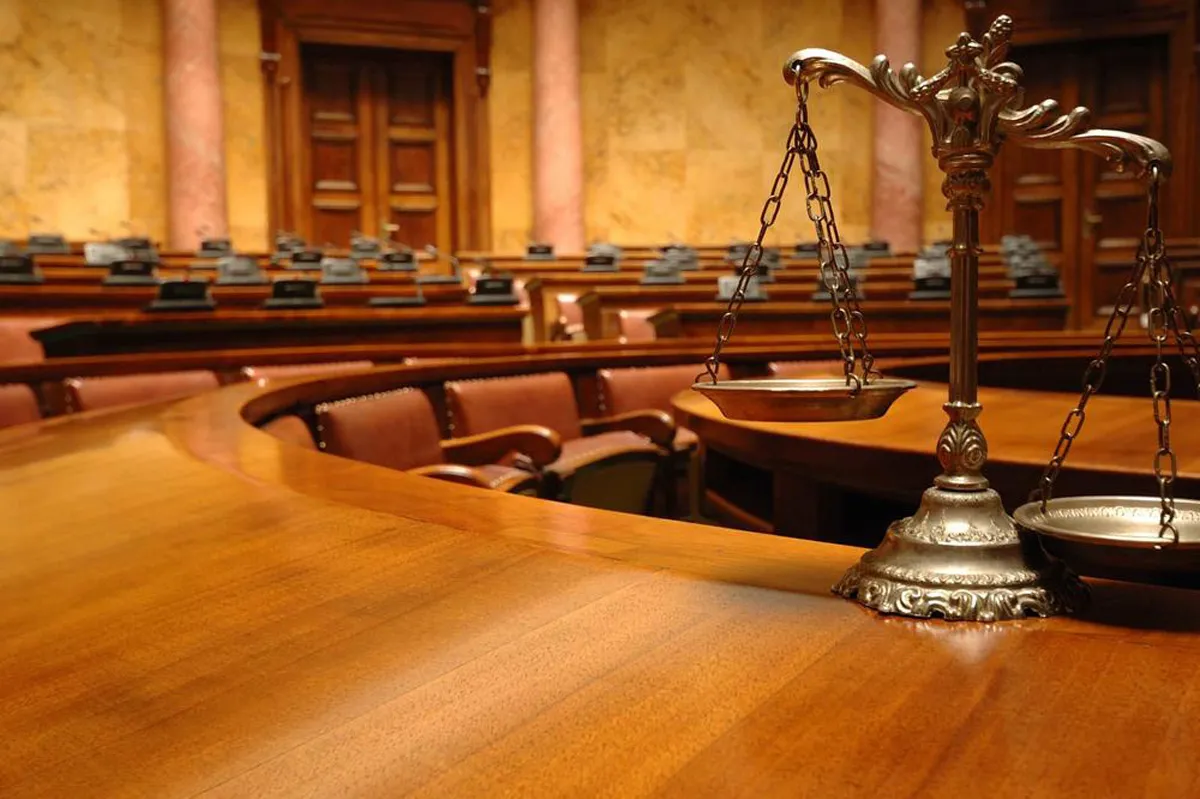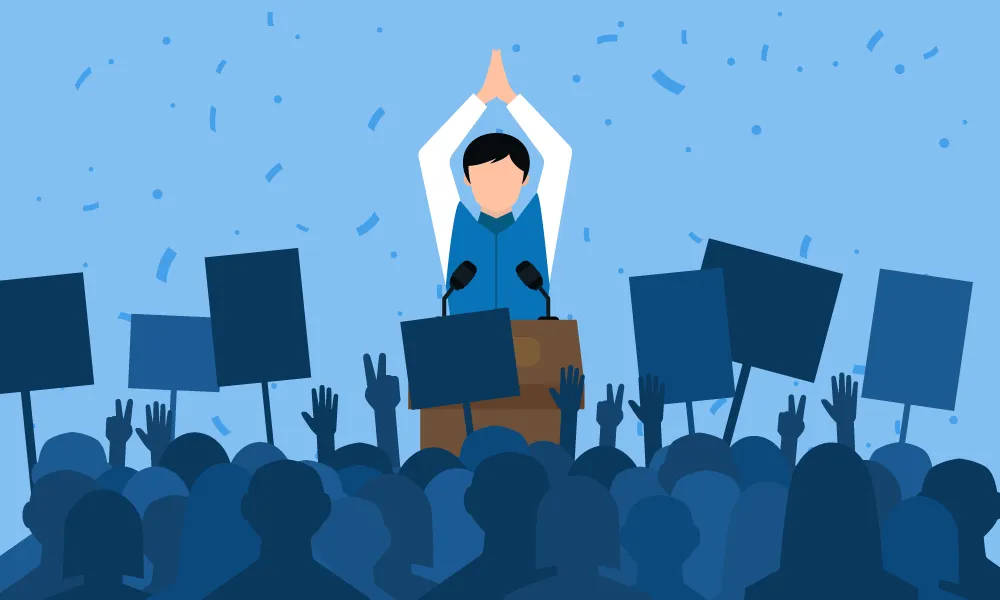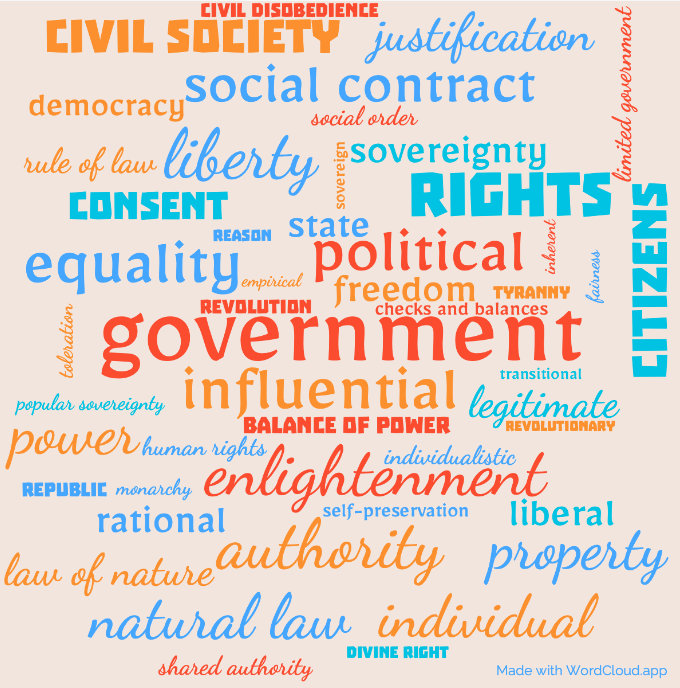Class 9 Political Science

Chapter 1 : What is Democracy and Why Democracy ?
The Chapter 1 of the Political Science Book discusses the concept of democracy and its significance in modern governance. The chapter begins by exploring the meaning of democracy, tracing its origins to ancient Greece where it was derived from the Greek words ‘demos’ meaning people and ‘kratos’ meaning rule. Democracy is defined as a form of government where people have the power to elect their representatives and participate in decision-making processes.
The chapter delves into the key features of democracy, such as free and fair elections, the protection of minority rights, the rule of law, and the respect for individual freedoms. It also highlights the importance of democratic values like equality, liberty, and fraternity in fostering a just and inclusive society. Furthermore, the chapter discusses the evolution of democracy in different countries, citing examples from Pakistan, Syria, China, Mexico, Iraq, and Zimbabwe. It examines instances of democratic transitions, authoritarian regimes, and challenges to democratic principles in various political contexts. The chapter also touches upon the role of media, civil society, and human rights organizations in promoting democracy and holding governments accountable. It emphasizes the need for active citizen participation, transparency, and accountability in sustaining democratic governance. Overall, Chapter 1 provides a comprehensive overview of democracy, its features, challenges, and the importance of upholding democratic values in ensuring a fair and equitable society.Class 9 Political Science Chapter 1 : What is Democracy and Why Democracy ?
NCERT PDF Free Download
Chapter Videos
Class 9 Political Science Chapter 1 : What is Democracy and Why Democracy ?
Extra Questions
(Latest Syllabus)
For more questions and detailed content watch out for our Class 9 SST Book (According to latest CBSE syllabus)
Class 9 Political Science Chapter 1 : Democracy
NCERT Questions
(Latest CBSE Syllabus)
1 Here is some information about four countries. Based on this information, how would you classify each of these countries. Write ‘democratic’, ‘undemocratic’ or ‘not sure’ against each of these.
Country A: People who do not accept the country’s official religion do not have a right to vote.
Country B: The same party has been winning elections for the last twenty years.
Country C: Ruling party has lost in the last three elections.
Country D: There is no independent election commission.
2 Here is some information about four countries. Based on this information, how would you classify each of these countries. Write ‘democratic’, ‘undemocratic’ or ‘not sure’ against each of these.
a. Country P: The parliament cannot pass a law about the army without the consent of the Chief of Army.
b. Country Q: The parliament cannot pass a law reducing the powers of the judiciary.
c. Country R: The country’s leaders cannot sign any treaty with another country without taking permission from its neighbouring country.
d. Country S: All the major economic decisions about the country are taken by officials of the central bank which the ministers cannot change.
Country P : Undemocratic since the parliament is authorised to pass a law about the army without the consent of the Chief of the Army Staff. However in the practice, since matters concerning the army also concern the security of the nation the chief of the army staff is always consulted and is kept in confidence while passing any law about the army.
Country Q : Democratic since the judiciary is an independent and autonomous body and holds a status equivalent or higher than that of the parliamentarians. Hence the parliamentarians cannot pass a law reducing the powers of the judiciary. If the parliamentarians do indeed pass a law curtailing the powers of the judiciary then not only will it be undemocratic and unconstitutional. Besides it will lead to a situation of dictatorship as there will be no checks on the activities of the parliamentarians. It is the independence of the judiciary that maintains a check on the activities of the parliamentarians.
Country R : Neither Democratic nor Undemocratic (The question is wrong as this is not an issue pertaining to democracy but of the independence and the sovereignty of the country. Every country is authorised to take its own decisions on issues that are relevant to itself. Hence forcing a country to take permissions from a neighbouring country for signing international treaties with another country tantamount to threatening the sovereignty and independence of the nation)
Country S : Not sure (This depends upon the type of economic decisions. The Central Bank of every nation, such as the Reserve Bank of India, enjoys complete autonomy and authority over several matters and is authorised to take some economic decisions without the permission or interference of the ministers. Issues pertaining to money supply and rate of interest falls under this category. Hence the decisions taken by the officials of the Central Bank in these matters cannot be changed by the ministers. For these set of decisions, this is a complete democratic situation.
On the other hand some economic decisions involving the expenditure, and revenue of the government have to be passed by the ministers before becoming a law. Therefore if in these matters also the officials of the central bank exercise their authority and do not permit ministers to make changes then the situation will be undemocratic).
3 Which of these is not a good argument in favour of democracy? Why?
a. People feel free and equal in a democracy.
b. Democracies resolve conflict in a better way than others.
c. Democratic government is more accountable to the people.
d. Democracies are more prosperous than others.
a) In favour of democracy
b) In favour of democracy
c) In favour of democracy
d) In favour of democracy
The question is wrong as all of these statements are good arguments in favour of democracy
4 Each of these statements contains a democratic and an undemocratic element. Write out the two separately for each statement.
a. A minister said that some laws have to be passed by the parliament in order to conform to the regulations decided by the World Trade Organisation (WTO).
b. The Election Commission ordered re-polling in a constituency where large-scale rigging was reported.
c. Women’s representation in the parliament has barely reached 10 per cent. This led women’s organisations to demand one-third seats for women.
a) The question is wrong as both the parts in the statement are democratic. The first part of the statement regrading the passing of laws by a parliament is Democratic. Simultaneously the second part of the statement regarding the regulations decided by the World Trade Organisation is also democratic because the World Trade Organisation itself takes decisions Democratically on the basis of recommendations by all the member nations of the World Trade Organisation. Once a nation confirms to a regulation made by the World Trade organisation at the international level, hen the nation is bound to implement it in its own country by passing a corresponding law.
b) The first half of the statement is Democratic as it shows that the Election Commission has enough authority to order a re polling. The second part of the statement is Undemocratic as election rigging in any nation is considered to be a suppression of democracy.
c) The first part of the statement is Undemocratic as it shows that in the nation women representation is barely 10% in the Parliament, although women in any economy constitute almost half of the total population. The second part of the statement is Democratic as demanding one third seeds for women in the Parliament will give greater representation to women and a greater opportunity for addressing the problems and issues pertaining to women.
5 Which of these is not a valid reason for arguing that there is a lesser possibility of famine in a democratic country?
a. Opposition parties can draw attention to hunger and starvation.
b. Free press can report suffering from famine in different parts of the country.
c. Government fears its defeat in the next elections.
d People are free to believe in and practise any religion.
d) This is not a valid reason for arguing that there is a lesser probability of famine in a democratic country as practising any religion is not related with famine in any manner.
6 There are 40 villages in a district where the government has made no provision for drinking water. These villagers met and considered many methods of forcing the government to respond to their need. Which of these is not a democratic method?
a. Filing a case in the courts claiming that water is part of right to life.
b. Boycotting the next elections to give a message to all parties.
c. Organising public meetings against government’s policies.
d. Paying money to government officials to get water.
a) Democratic as every citizen has a right to approach the court in case his fundamental rights are not are being snatched and are not being guaranteed
b) Neither Democratic nor undemocratic as there is no law in India which makes it mandatory for all citizens to cast their vote and hence by boycotting the elections they are not going against the law of the land or against any notions of democracy. Besides many times all the parties have similar manifestos and implement similar policies. Hence even if people participate in an election and vote for a particular party they can least expect to have a redressal of their problems.
Simultaneously it is undemocratic because by boycotting the next elections it will elongate the term of the current party in power. Since the current party has been apathetic towards the concerns of the population, It will only elongate the never ending problems of the villagers. Hence in these circumstances there is a need for a change of the political party which can only be done through elections.
c) Democratic since in a democracy people have the right to object to the policies made by the government or by their representatives in the parliament. But the public meetings can be democratic only so long as they are peaceful and free of violence and do not violate any law of the land.
d) Undemocratic as paying money to the government officials to get water not only promotes corruption in the country but will also encourage government officials to take bribes for the provision of every government facility in the future
7 Write a response to the following arguments against democracy:
a. Army is the most disciplined and corruption-free organisation in the country. Therefore army should rule the country.
b. Rule of the majority means the rule of ignorant people. What we need is the rule of the wise, even if they are in small numbers.
c. If we want religious leaders to guide us in spiritual matters, why not invite them to guide us in politics as well. The country should be ruled by religious leaders.
a) Army is indeed the most disciplined and corruption free organisation in the country. Yet it is trained for safeguarding the borders and not for taking decisions on the internal matters of the country and the day to day running of the nation. Hence the army should be restricted to doing what it does best which is providing security to the nation and not running the nation. Otherwise it will lead to dictatorship or pseudo Democracy as in the case of Myanmar and Pakistan respectively.
b) Rule of majority does not in any manner imply rule of the ignorant people. Every section of the society has its own concerns and problems which they wish to raise and get them solved. Hence even if there are a few wise men, they may not be aware of the problems of the entire population and each subsection of the population. Hence there should be a fair representation of each sub section of the population in the law making body.
c) The country should not be ruled by religious leaders as religion, politics and administration are completely different aspects of a country and public life. Hence the religious leaders should be entrusted with matters related to spiritualism
8 Are the following statements in keeping with democracy as a value? Why?
a. Father to daughter: I don’t want to hear your opinion about your marriage. In our family children marry where the parents tell them to.
b. Teacher to student: Don’t disturb my concentration by asking me questions in the classroom.
c. Employee to the officer: Our working hours must be reduced according to the law.
a) No, as this statement reflects authoritarian attitude of the father and that the daughter is not permitted to marry a person of her choice although she is permitted to do so by law.
b) No, as this reflects the authoritarian attitude of the teacher as she is not permitting the student to ask any questions in the class and get his doubts solved
c) Yes, as of maximum number of working hours have been stipulated in the law and therefore forcing the workers to work beyond those hours is unconstitutional and undemocratic.
9 Consider the following facts about a country and decide if you would call it a democracy. Give reasons to support your decision.
a. All the citizens of the country have right to vote. Elections are held regularly.
b. The country took loan from international agencies. One of the conditions for giving loan was that the government would reduce its expenses on education and health.
c. People speak more than seven languages but education is available only in one language, the language spoken by 52 percent people of that country.
d. Several organisations have given a call for peaceful demonstrations and nation wide strikes in the country to oppose these policies. Government has arrested these leaders.
e. The government owns the radio and television in the country. All the newspapers have to get permission from the government to publish any news about government’s policies and protests.
a) May or may not be called a true democracy as it does not mention anything about the manner in which the elections are held. In case the opposition parties are not permitted to field their candidates or the government officials are forced to vote for the government in power, then these elections will not be holding the true spirit of democracy.
b) The question is invalid as no international agency puts the condition on the government for reducing its expenditure on education and health. Rather every international organisation recognises the importance of conducting expenditures on education and health and hence Promote these social activities of the government.
c) Not a true democracy as the education is provided only in one language which is spoken by 52% population of the country. The remaining 48% of population of the country are forced to receive education in a language which is not their mother tongue and hence may not be able to imbibe all the learnings provided by the nation’s education system.
d) This depends upon the nature of demonstration and strikes held nationwide. Even in peaceful demonstrations, no organisation is permitted to obstruct the regular movement of traffic on the roads, or the movement of trains on railway tracks or go on hunger strikes till death. In these situations the government is authorised to arrest the leaders. Besides in recent years the Supreme Court has made calling of nationwide Bandhs unconstitutional.
e) Not a true democracy because even if the radio and television channels in the country are owned by the government, yet it is the right of the people to know about the pitfalls in the government policies. They also have a right to know about the opinions of the opposition parties and of the protesters against the government’s policies.
10 In 2004 a report published in USA pointed to the increasing inequalities in that country. Inequalities in income reflected in the participation of people in democracy. It also shaped their abilities to influence the decisions taken by the government. The report highlighted that:
a. If an average Black family earns $ 100 then the income of average White family is $ 162. A White family has twelve times more wealth than the average Black family.
b. In a President’s election ‘nearly 9 out of 10 individuals in families with income over $ 75,000 have voted. These people are the top 20% of the population in terms of their income. On the other hand only 5 people out of 10 from families with income less than $ 15,000 have voted. They are the bottom 20% of the population in terms of their income.
c. About 95% contribution to the political parties comes from the rich. This gives them opportunity to express their opinions and concerns, which is not available to most citizens.
d. As poor sections participate less in politics, the government does not listen to their concerns – coming out of poverty, getting job, education, health care and housing for them. Politicians hear most regularly about the concerns of business persons and the rich.
Write an essay on ‘Democracy and Poverty’ using the information given in this report but using examples from India.
In the context of the information provided in the report from the USA regarding increasing inequalities and their impact on democracy, let’s explore the theme of “Democracy and Poverty” with examples from India:
Essay: Democracy and Poverty in India
Democracy, as a form of government, is often lauded for its principles of equality, justice, and inclusivity. However, the reality in many democratic nations, including India, reveals a stark contrast when it comes to addressing poverty and economic disparities within society.
In India, a country known for its diverse population and rich cultural heritage, the issue of poverty remains a significant challenge despite being a democratic republic. The socio-economic landscape of India is characterized by wide income gaps, with a substantial portion of the population living below the poverty line.
The report from the USA, highlighting the income disparities between different racial groups and their impact on political participation, resonates with the Indian context. In India, marginalized communities, including Dalits, Adivasis, and other economically disadvantaged groups, often face barriers to political engagement due to their socio-economic status. This results in their voices being underrepresented in the democratic process.
Furthermore, the influence of wealth on political contributions and decision-making is a prevalent issue in Indian politics. Similar to the USA, a significant portion of political funding in India comes from affluent individuals and corporate entities, giving them disproportionate access to policymakers and the ability to shape political agendas to suit their interests.
The statistics provided in the report regarding voting patterns based on income levels also hold relevance in the Indian scenario. Studies have shown that voter turnout is lower among economically disadvantaged communities compared to wealthier segments of society. This disparity in political participation further marginalizes the voices of the poor and hinders their ability to advocate for policies that address their socio-economic needs.
The consequences of poverty on democratic governance in India are multifaceted. The lack of access to basic necessities such as education, healthcare, and housing perpetuates the cycle of poverty, limiting opportunities for social mobility and economic empowerment. As a result, policymakers often prioritize the concerns of affluent groups over the needs of the marginalized, exacerbating socio-economic inequalities.
In conclusion, the intersection of democracy and poverty in India underscores the need for inclusive and equitable governance that prioritizes the welfare of all citizens, especially the most vulnerable segments of society. Addressing poverty requires not only economic interventions but also structural reforms that promote social justice, empower marginalized communities, and ensure their meaningful participation in the democratic process.
By examining the challenges posed by poverty within the framework of democracy, India can strive towards a more inclusive and equitable society where every voice is heard, and every citizen has the opportunity to thrive.

Chapter 2 : Constitutional Design
In the chapter “Constitutional Design” the focus is on understanding the significance of a constitution in a democratic setup. It discusses how a constitution serves as the fundamental law that governs the relationship between the government and its citizens. The chapter highlights the process of constitution-making in South Africa and India, emphasizing the values and principles that shape these documents.
Key points covered in the chapter include:- The importance of a constitution in defining the powers of the government and protecting the rights of citizens.
- The dynamic nature of constitutions, allowing for amendments to reflect changing societal needs.
- The role of the Constitution in establishing institutional arrangements and delineating the distribution of powers among different branches of government.
- The guiding values of the Indian Constitution, such as justice, liberty, equality, and fraternity, as reflected in the Preamble.
- The significance of leaders’ visions and the preamble in shaping the philosophy of the Constitution.
- The chapter also touches upon the historical context of constitution-making in India, including the contributions of various leaders and the aspirations of the nation for freedom and progress.
Class 9 Political Science Chapter 2 : Constitutional Design
NCERT Free PDF Download
Chapter Videos
Class 9 Political Science Chapter 2 : Constitutional Design
Extra Questions
(Latest Syllabus)
For more questions and detailed content watch out for our Class 9 SST Book (According to latest CBSE syllabus)
Class 9 Political Science Chapter 2 : Constitutional Design
NCERT Question
(Latest CBSE Syllabus)
4 Match the following leaders with their roles in the making of the Constitution:
| S.No. | List 1 | List2 |
|---|---|---|
| 1) | Motilal Nehru | A. President of the Constituent assembly |
| 2) | B.R. Ambedkar | B. Member of the Constituent Assembly |
| 3) | Rajendra Prasad | C. Chaiman of the Drafting Committee |
| 4) | Sarojini Naidu | D. Prepared a Constitution for India in 1928 |
6 Here are some of the guiding values of the Constitution and their meaning. Rewrite them by matching them correctly.
a Sovereign i Government will not favour any religion.
b Republic ii People have the supreme right to make decisions.
c Fraternity iii Head of the state is an elected person.
d Secular iv People should live like brothers and sisters.
7 How did your school celebrate the Constitution Day on November exercises 26th? Prepare a brief report.
a Filing a case in the courts claiming that water is part of right to life.
b Boycotting the next elections to give a message to all parties.
c Organising public meetings against government’s policies.
d Paying money to government officials to get water.

Chapter 3 : Electoral Politics
- Importance of Elections in Democracy:
- Elections are essential in a democracy as they allow people to govern through their chosen representatives.
- Electoral competition among parties serves the interests of the people by providing them with choices and opportunities to express their preferences.
- Democratic Elections vs. Non-Democratic Elections:
- The chapter distinguishes between democratic and non-democratic elections based on the principles of free and fair competition, regular intervals for elections, and the election of candidates preferred by the people.
- Assessment of Elections in India:
- The chapter evaluates the Indian electoral process at various stages, from constituency boundary delineation to result declaration.
- It examines the discrepancies between what should ideally happen in elections and the actual practices observed in India.
- Role of the Election Commission:
- The Election Commission of India plays a crucial role in ensuring free and fair elections by overseeing the electoral process, addressing malpractices, and upholding the integrity of the electoral system.
- Challenges and Reforms:
- The chapter acknowledges the challenges faced in conducting completely free and fair elections in India.
- It emphasizes the need for reforms to enhance the electoral process and make elections more transparent and accountable.
- Misconceptions and Critical Thinking:
- The chapter addresses common misconceptions about elections, such as gender biases in voting, the role of party politics, and candidate eligibility criteria.
- It encourages critical thinking and analysis of electoral practices to promote a deeper understanding of democratic principles.
Class 9 Political Science Chapter 3 : Electoral Politics
NCERT PDF Free Download
Chapter Videos
Class 9 Political Science Chapter 3 : Electoral Politics
Extra Questions
(Latest Syllabus)
For more questions and detailed content watch out for our Class 9 SST Book (According to latest CBSE syllabus)
Class 9 Political Science Chapter 3 : Electoral Politics
NCERT Question
(Latest CBSE Syllabus)
3 Match the following :
| S.No. | List 1 | List2 |
|---|---|---|
| 1) | It is necessary to keep voter list upto date because | A. There is a fair representation of sections of our society |
| 2) | Some constituencies are reserved for SCs and STs so that | B. Everyone has equal opportunity to elect their representative |
| 3) | Everyone has one and only one vote so that | C. All candidates must have a fair chance of competing in elections |
| 4) | Party in power is not allowed to use government vehicles | D. Some people may have moved away from the area where they voted last |
a It is necessary to keep the voters list up to date because i there is a fair representation of all
sections of our society
b Some constituencies are reserved for SCs and STs so that ii everyone has equal opportunity to elect
their representative
c Everyone has one and only one vote so that iii all candidates must have a fair chance
of competing in elections
d Party in power is not allowed to use government vehicles iv some people may have moved away
from the area where they voted last
5 Surekha is an officer in-charge of ensuring free and fair elections in an assembly constituency in a state. Describe what should she focus on for each of the following stages of election:
a Election campaign
b Polling day
c Counting day
6 The table below gives the proportion of different communities among the candidates who won elections to the US Congress. Compare these to the proportion of these communities in the population of the US. Based on this, would you suggest a system of reservations in the US Congress? If yes, why and for which communities? If no, why not?
| Proportion of the community (in percentage) in the | |
| House of Representatives | Population of US |
Blacks | 8 | 13 |
Hispanics | 5 | 13 |
Whites | 86 | 70 |

Chapter 4 : Working of Institutions
Chapter 4 of the NCERT Political Science textbook titled “Working of Institutions” delves into the functioning of democratic institutions in a democracy, focusing on the legislature, executive, and judiciary. Here is a detailed summary of the chapter:
Introduction to Democratic Institutions: The chapter begins by highlighting the importance of democratic institutions in a democracy. It emphasizes that rulers in a democracy must adhere to rules and procedures and work within institutions.
Key Institutions in a Democracy:
Legislature: The chapter discusses the role of the legislature in making laws and overseeing the functioning of the government. It explores how the legislature is connected to other institutions and how its functioning impacts the democratic nature of the government.
Executive: The chapter delves into the role of the executive in implementing policies and decisions taken by the government. It highlights the hierarchy within the executive and the importance of support from other institutions, such as the legislature, for decision-making.
Judiciary: The chapter examines the role of the judiciary in resolving disputes and upholding the rule of law. It discusses the independence of the judiciary and its significance in ensuring justice and fairness in a democracy.
Case Study: The chapter presents a case study involving an Office Memorandum issued by the Government of India in 1990, which became controversial and led to a legal battle. The case study illustrates how major policy decisions are taken and the importance of institutions in the decision-making process.
Role of Institutions in Governance: The chapter emphasizes the interconnectedness of democratic institutions and how they collectively carry out the work of government. It encourages readers to think about examples from the functioning of the government at both the national and state levels.
Discussion Questions: The chapter concludes with thought-provoking questions posed by fictional characters, prompting readers to reflect on issues such as the balance of power between the President and Prime Minister, the role of the judiciary in a democracy, and the importance of consultation in decision-making.
Overall, the chapter provides a comprehensive overview of how democratic institutions operate, interact, and contribute to the functioning of a democratic government. It encourages readers to critically analyze the working of these institutions and their impact on governance in a democracy.
Class 9 Political Science Chapter 4 : Working of Institutions
NCERT Chapter Free Download
Chapter Videos
Class 9 Political Science Chapter 4 : Working of Institutions
Extra Questions
Latest Syllabus
For more questions and detailed content watch out for our Class 9 SST Book (According to latest CBSE syllabus)
Class 9 Political Science Chapter 4 : Working of Institutions
NCERT Question
(Latest CBSE Syllabus)
3 Match the following :
| S.No. | List 1 | List2 |
|---|---|---|
| 1) | It is necessary to keep voter list upto date because | A. There is a fair representation of sections of our society |
| 2) | Some constituencies are reserved for SCs and STs so that | B. Everyone has equal opportunity to elect their representative |
| 3) | Everyone has one and only one vote so that | C. All candidates must have a fair chance of competing in elections |
| 4) | Party in power is not allowed to use government vehicles | D. Some people may have moved away from the area where they voted last |
a It is necessary to keep the voters list up to date because i there is a fair representation of all
sections of our society
b Some constituencies are reserved for SCs and STs so that ii everyone has equal opportunity to elect
their representative
c Everyone has one and only one vote so that iii all candidates must have a fair chance
of competing in elections
d Party in power is not allowed to use government vehicles iv some people may have moved away
from the area where they voted last
5 Surekha is an officer in-charge of ensuring free and fair elections in an assembly constituency in a state. Describe what should she focus on for each of the following stages of election:
a Election campaign
b Polling day
c Counting day
6 The table below gives the proportion of different communities among the candidates who won elections to the US Congress. Compare these to the proportion of these communities in the population of the US. Based on this, would you suggest a system of reservations in the US Congress? If yes, why and for which communities? If no, why not?
| Proportion of the community (in percentage) in the | |
| House of Representatives | Population of US |
Blacks | 8 | 13 |
Hispanics | 5 | 13 |
Whites | 86 | 70 |

Chapter 5 : Democratic Rights
- Importance of Elections in Democracy:
- Elections are essential in a democracy as they allow people to govern through their chosen representatives.
- Electoral competition among parties serves the interests of the people by providing them with choices and opportunities to express their preferences.
- Democratic Elections vs. Non-Democratic Elections:
- The chapter distinguishes between democratic and non-democratic elections based on the principles of free and fair competition, regular intervals for elections, and the election of candidates preferred by the people.
- Assessment of Elections in India:
- The chapter evaluates the Indian electoral process at various stages, from constituency boundary delineation to result declaration.
- It examines the discrepancies between what should ideally happen in elections and the actual practices observed in India.
- Role of the Election Commission:
- The Election Commission of India plays a crucial role in ensuring free and fair elections by overseeing the electoral process, addressing malpractices, and upholding the integrity of the electoral system.
- Challenges and Reforms:
- The chapter acknowledges the challenges faced in conducting completely free and fair elections in India.
- It emphasizes the need for reforms to enhance the electoral process and make elections more transparent and accountable.
- Misconceptions and Critical Thinking:
- The chapter addresses common misconceptions about elections, such as gender biases in voting, the role of party politics, and candidate eligibility criteria.
- It encourages critical thinking and analysis of electoral practices to promote a deeper understanding of democratic principles.
Class 9 Political Science Chapter 5 : Democratic Rights
NCERT PDF Free Download
Chapter Videos
Class 9 Political Science Chapter 5 : Democratic Rights
Extra Questions
(Latest Syllabus)
For more questions and detailed content watch out for our Class 9 SST Book (According to latest CBSE syllabus)
Class 9 Political Science Chapter 5 : Democratic Rights
NCERT Question
(Latest CBSE Syllabus)
3 Match the following :
| S.No. | List 1 | List2 |
|---|---|---|
| 1) | It is necessary to keep voter list upto date because | A. There is a fair representation of sections of our society |
| 2) | Some constituencies are reserved for SCs and STs so that | B. Everyone has equal opportunity to elect their representative |
| 3) | Everyone has one and only one vote so that | C. All candidates must have a fair chance of competing in elections |
| 4) | Party in power is not allowed to use government vehicles | D. Some people may have moved away from the area where they voted last |
a It is necessary to keep the voters list up to date because i there is a fair representation of all
sections of our society
b Some constituencies are reserved for SCs and STs so that ii everyone has equal opportunity to elect
their representative
c Everyone has one and only one vote so that iii all candidates must have a fair chance
of competing in elections
d Party in power is not allowed to use government vehicles iv some people may have moved away
from the area where they voted last
5 Surekha is an officer in-charge of ensuring free and fair elections in an assembly constituency in a state. Describe what should she focus on for each of the following stages of election:
a Election campaign
b Polling day
c Counting day
6 The table below gives the proportion of different communities among the candidates who won elections to the US Congress. Compare these to the proportion of these communities in the population of the US. Based on this, would you suggest a system of reservations in the US Congress? If yes, why and for which communities? If no, why not?
| Proportion of the community (in percentage) in the | |
| House of Representatives | Population of US |
Blacks | 8 | 13 |
Hispanics | 5 | 13 |
Whites | 86 | 70 |
